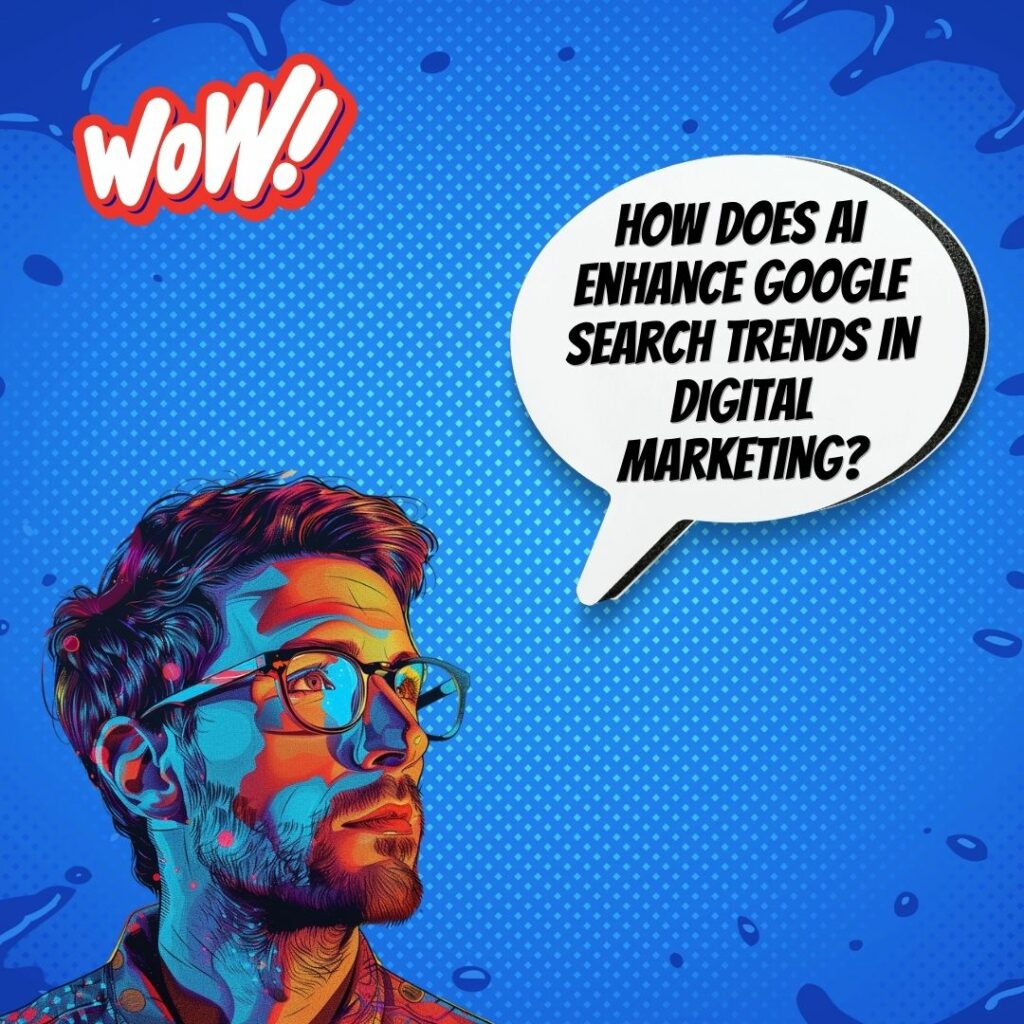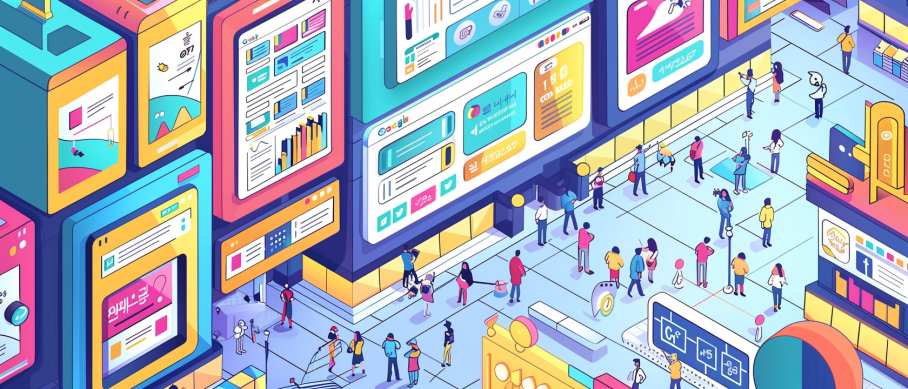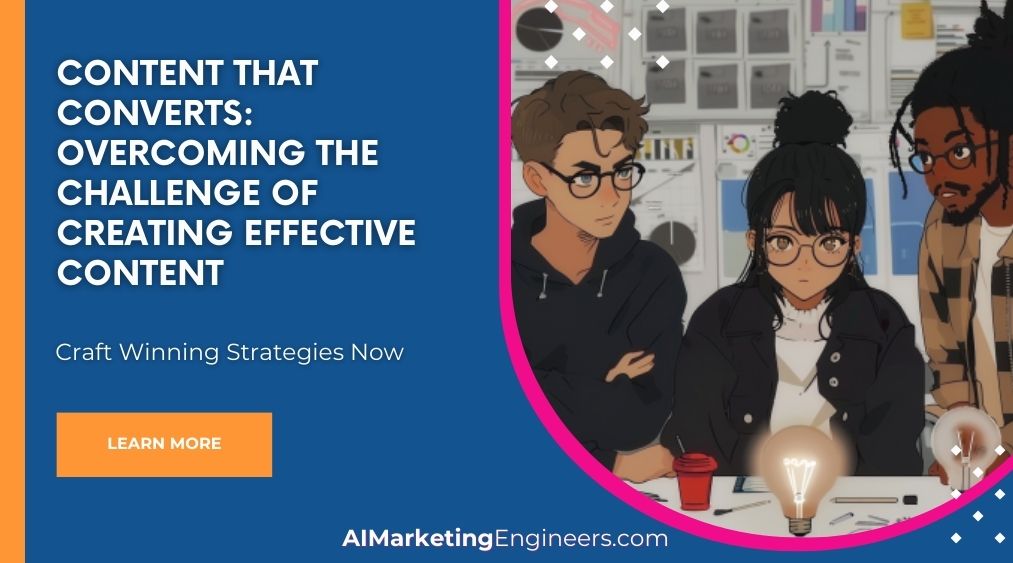Key Takeaways
✅ Enhanced User Experience: AI is reshaping Google search, providing speedy summaries and rich context directly in the search results. No more sifting through pages – users can now find what they need efficiently, thanks to Google's Search Generative Experience (SGE).
✅ Personalized and Integrated Search Results: Imagine a search engine that knows you so well it feels like a mind reader. AI is making this a reality by delivering custom-tailored results, influenced by your past clicks, likes, and even local buzz – turning every search into a personalized shopping aisle.
✅ Increased Importance of High-Quality Content: With AI prioritizing depth over breadth, it's quality time for your content. Businesses must now focus on detailed, informative articles if they hope to stand out in search engine results and appeal to the AI algorithms leading the charge.

Introduction
Ever wondered how AI is reshaping the world of Google search and, consequently, the whole playground for digital marketers? At the heart of this transformation lies generative AI, acting as the catalyst for change. This article delves into the revolution in Google search trends fueled by AI and the ripple effects it has on marketing strategies worldwide.
From the rise of Generative AI in Search to the profound Impact on Marketing Strategy, the digital landscape is evolving. It's not just about keywords anymore; it's about context, personalization, and catering to the user's intent. But how can brands keep pace with these changes, and what does it take to excel in this new environment?
As we peel back the layers of AI in search, we'll uncover the Key Changes in Search Behavior and discuss how to Mitigate the Impact on Brands. Grasp the Future of Digital Marketing in an era where algorithms are growing smarter by the day. Get ready to dive into a sea of actionable insights and groundbreaking strategies that promise to not just float your boat but turn it into a leading vessel in the vast ocean of digital marketing.
Top Statistics
| Statistic | Insight |
|---|---|
| AI-Powered Search Interest: 49% of U.S. consumers are interested in AI-powered search. | With nearly half of consumers intrigued by AI search capabilities, businesses should consider leveraging AI to refine their search marketing strategies. |
| Dominant Market Position: Google holds a dominant position in the global search market, with a market share of 91.47%. | A commanding share such as this amplifies the importance of aligning marketing efforts with Google's platforms and understanding AI's growing influence on search. |
| AI and Forecasting: AI analyzes vast amounts of past search data to forecast search trends. | By harnessing predictive analytics, AI in digital marketing can provide more targeted content and improve a site's visibility on Google. |
| Mobile Search Prevalence: Over 60% of searches come from mobile devices. | This statistic underlines the necessity for mobile optimization in digital marketing to enhance the user experience and capitalize on mobile search traffic. |
| Google SERP CTR: The first link on a search engine result page (SERP) has a CTR of 22%, while the 10th link gets a CTR of only 1.9%. | Positioning on SERPs is critical, emphasizing the need for AI and SEO tools to push your content towards the coveted first result for increased visibility and clicks. |
Generative AI: Transforming Search Engine Dynamics
The landscape of digital marketing is on the cusp of a radical transformation, thanks to the integration of Generative AI into search engines. One might wonder, how are machines that can learn and generate content on their own altering the established order of Google searches? In essence, artificial intelligence is bridging the gap between the scattered bits of information online and the quest for comprehensive, tailor-made answers users seek. This technology is reshaping how users interact with search engines, making searches more intuitive and results more personalized. It emphasizes the need for high-quality content that resonates with AI algorithms. Marketers must stay ahead by understanding how AI processes and prioritizes information.
The Impact of AI-Powered Search Engines
Search engines driven by AI are churning out responses that are not only relevant but also context-aware. This isn't just about recognizing keywords; it's about understanding the intent behind them. Imagine typing a question into Google and getting back a curated brief, filled with nuances that reflect a deep understanding of your query. That's the technology we're talking about – one that can discern, connect the dots, and offer solutions which feel surprisingly human. This approach enhances user satisfaction by delivering more accurate and contextually appropriate results. It encourages a more conversational and natural interaction with search engines. Marketers must focus on creating content that aligns with these advanced search capabilities.
Adapting Marketing Strategies to AI Search
For the marketing folk out there, this shifts the goalposts. What does this mean for your marketing strategy? Traditional SEO tactics, while still relevant, may no longer be sufficient. As AI search tools summarize search results and present well-rounded viewpoints, the emphasis on rich, quality content has never been higher. Marketers need to think about aligning their content with these intelligent systems to ensure visibility and relevance. This shift necessitates a deeper understanding of user intent and search behavior. Integrating AI-driven insights into content strategy can enhance search performance. A holistic approach that combines SEO, content marketing, and AI insights is crucial.
Predicting and Responding to New Search Behaviors
Anticipating changes in search behavior is essential for staying ahead. With AI at the helm, search engines are increasingly adept at compiling related conversations and providing in-depth answers. Users expect not just information but knowledge that's been chewed over and digested by the machine's algorithms, providing a thought-out perspective. What does this mean for brands? It underscores the importance of being part of the conversation across all platforms, leveraging customer reviews, and maintaining a robust digital footprint. It’s no longer enough to be present; brands must be actively engaged, contextually aware, and responsive to how these AI systems interpret and portray their information. Adapting to these changes involves continuous monitoring and adjustment of digital strategies. Brands must ensure they are contributing valuable content to relevant discussions. Being proactive in managing online reputation is more important than ever.
Strategies for Embracing AI in Marketing
To mitigate the impact of advanced search technologies, marketers must go back to the drawing board and reassess their approach. The fusion of paid search efforts, local SEO, and a keen eye on online reputation is not just beneficial—it’s imperative. Brands must foster a clear, authoritative voice that resonates with both AI systems and human users alike. Engaging with customers through reviews and utilizing location-based information can provide AI with robust data sets to work with, ensuring a brand’s relevancy in search results. Marketers must adapt and adopt an all-encompassing strategy that blurs the lines between the various arms of digital marketing, forming a cohesive whole. Leveraging AI tools can provide deeper insights into customer behavior. Personalized marketing strategies will become more effective with AI-driven data. Consistent and transparent communication enhances brand trust and loyalty.
The Future of Digital Marketing with AI
As AI-driven systems continue to mature, understanding and leveraging them becomes key to the future of digital marketing. Marketers must stay attuned to technology's pulse, using advanced analytics and keen insights to inform their strategies. It's not just about adapting to change; it's about anticipating it and molding it to one's advantage. With each evolution in AI, digital marketing tactics will need to evolve just as rapidly. Brands that iterate and innovate their approach in tandem with these technological advances will not just survive the shifting digital tide, but thrive within it. Staying informed about AI developments is crucial for long-term success. Investing in AI training and tools can provide a competitive edge. Embracing change and innovation will drive sustainable growth in the digital landscape.
AI Marketing Engineers Recommendation
Recommendation 1: Enhance Content Creation with Generative AI: Use Generative AI to produce diverse content that is optimized for current Google Search Trends. By analyzing trending keywords and topics, AI tools like OpenAI's GPT-3 can write blog posts, social media updates, and even ad copy that resonates with the latest search queries. According to a study by McKinsey, businesses leveraging AI in content creation can see a content production speed increase by up to five times. This use of AI not only saves time but also keeps your content relevant and highly searchable.
Recommendation 2: Predict Consumer Behavior with AI-Driven Analytics: Employ advanced analytics powered by Generative AI to forecast shifts in Google Search Trends. AI technology facilitates more accurate predictions of future trends by crunching vast amounts of search data and identifying patterns that might elude human analysts. By doing so, companies can stay ahead of the curve and adjust their strategies swiftly. Businesses using AI for predictive analytics, as reported by SAS, are 1.6 times more likely to outperform their competitors.
Recommendation 3: Personalize Digital Experiences with AI Algorithms: Implement Generative AI solutions to tailor digital marketing efforts for individual consumers based on their Google Search behavior. AI algorithms can craft personalized recommendations and search-optimized user experiences by analyzing users' past searches, clicked links, and time spent on various contents. Companies that excel in personalization have seen an increase in sales of at least 10%, according to a study from Boston Consulting Group. Leveraging this approach can significantly improve user engagement and conversion rates.
Relevant Links
- Master the Future: Aligning SEO with AI Technology
- Conquer Chinese Search: Advanced Baidu SEO Strategies
- Unleash Marketing ROI: Power Performance Strategies in India
- Target Smarter: The Transformative Role of Big Data in Chinese PPC
- Boost Your Brand's Reach with VK, Russia's Social Giant
Conclusion
As we wrap up our exploration of AI in digital marketing and its influence on Google search trends, it's evident that the rise of generative AI is more than just a fleeting trend; it's a fundamental shift in how search engines operate and serve information. By digging deep and providing answers that go beyond the surface, these advanced systems are changing the game for everyone who relies on Google to find answers—marketers most of all.
The move away from simple keyword matching to delivering a nuanced, context-rich experience means that marketers need to rethink their approach. No longer can we rely solely on traditional tactics; the onset of generative AI demands creativity and a holistic strategy that touches all facets of a digital presence. From reviews and reputation management to local search nuances and content that resonates on a deeper level, the parameters have expanded significantly.
What does this mean for your brand or your marketing strategy? It means staying informed and being adaptable. Keep an eye on these evolving technologies and the ever-changing landscape of user behavior. By understanding and anticipating the capabilities of AI-driven search tools, brands can create content that stands out, speaks directly to their audience's needs, and ensures visibility in a crowded digital space.
The future is coming at us fast, and it's fueled by data and powered by artificial intelligence. The potential for brands that harness these innovative tools is immense—better targeting, sharper insights, and more meaningful connections with consumers. So, as you think about your next campaign or how to improve your search rankings, ask yourself: Are you ready for the AI revolution in digital marketing? Because just like any other aspect of technology, when it comes to staying ahead of the curve, the only way to win is to keep learning, adapting, and growing right alongside these powerful tools.
FAQs
Question 1: What is Generative AI in Search?
Answer: Generative AI in search is all about making search engines smarter, so they can give you a more personalized experience. Imagine asking a friend for information and getting a great summary instead of a simple list of places to look – that's what we're talking about.
Question 2: How Does Generative AI Change Search Results?
Answer: It adds a bit of magic to your searches. You're not just getting pages of links anymore. Instead, you get mini-articles that tell you what you need to know straight off.
Question 3: What are the Key Features of AI-Enhanced Search?
Answer: Imagine getting the inside scoop from your search engine – quick summaries, pretty pictures, tailored information. It's like having a super-smart buddy in your pocket, who even remembers your chats and documents to give you just what you need.
Question 4: How Does AI Impact SEO Strategies?
Answer: This is where things get real for website creators. Search engines are looking for the cream of the crop content-wise, so folks need to step up their game and provide really helpful, detailed stuff if they want to catch folks' attention.
Question 5: What Role Does Social Media Play in AI-Driven Search?
Answer: It's big, really big. When social media gets chatty and interesting, AI notices and wants to introduce everyone to the fireworks. So, you gotta be social smart – share the kind of content that people can't stop talking about.
Question 6: How Can Brands Mitigate the Impact of AI Search on Their Visibility?
Answer: It's all about pulling everything together – ads, SEO, social media, and all the works. Make them sing in harmony and you'll keep your audience close.
Question 7: How Can Marketers Leverage AI-Driven Upgrades for Better Results?
Answer: Marketers have got to dive deep into creating stand-out content, focus on making the browsing journey enjoyable, align their tactics across platforms, and really get into the heads of their users with smart data analysis.
Question 8: What Are the Opportunities and Challenges of AI-Generated Content?
Answer: It's a mixed bag – you've got the sweet spot of better targeting, but there's also the tough crowd vying for the spotlight, which means you've got to bring your A-game content-wise.
Question 9: How Can Businesses Stay Ahead in the Evolving Digital Landscape?
Answer: Stay on your toes! Embrace the new AI search game, dig into data like a detective, focus on giving folks a top-notch online experience, and keep your marketing mix smooth and integrated.
Academic References
- Whitler, K. A. (2024). How Google's AI Search Will Change Marketing Strategy. Forbes. This insightful Forbes article examines the sweeping modifications in marketing strategies necessitated by Google's embedding of AI into its search algorithms, outlining the need for marketers to swiftly adapt to remain competitive.
- Digital First AI. How Generative AI is Revolutionizing Digital Marketing. Digital First AI. The source offers a deep dive into how generative AI tools are redefining the digital marketing landscape by automating content creation, personalizing marketing initiatives, and boosting customer interaction, thus leading to increased operational efficiency.
- Kapko, M. (2024). Google debuts new agents, content creation tools and search features powered by generative AI. Digiday. Google's recent additions to its suite of AI tools for content creation and search are detailed in Digiday, pointing to an expanding reliance on generative AI to enhance user experience and streamline task execution.
- Southern, M. (2024). Generative AI's role in shaping the future of advertising. Search Engine Land. This article presents an exploration of the emerging role of generative AI in advertising, stressing how it is poised to boost both the precision and innovation of advertising campaigns.
- Schwartz, E. (2024). How generative AI is clouding the future of Google search. Fast Company. This piece from Fast Company investigates the problems posed by the surge of AI-generated content and its potential to undermine the credibility and user confidence essential to Google's search service.












